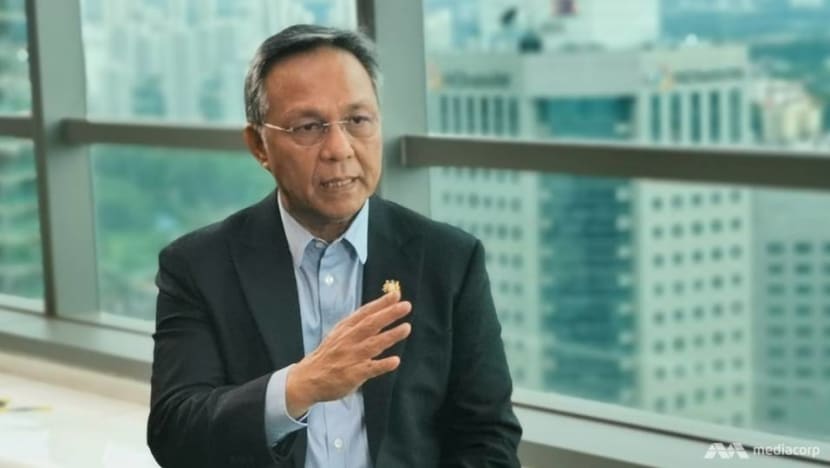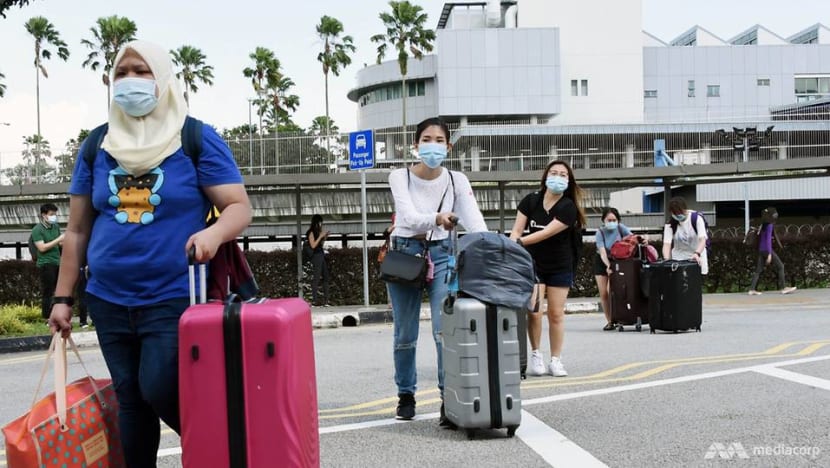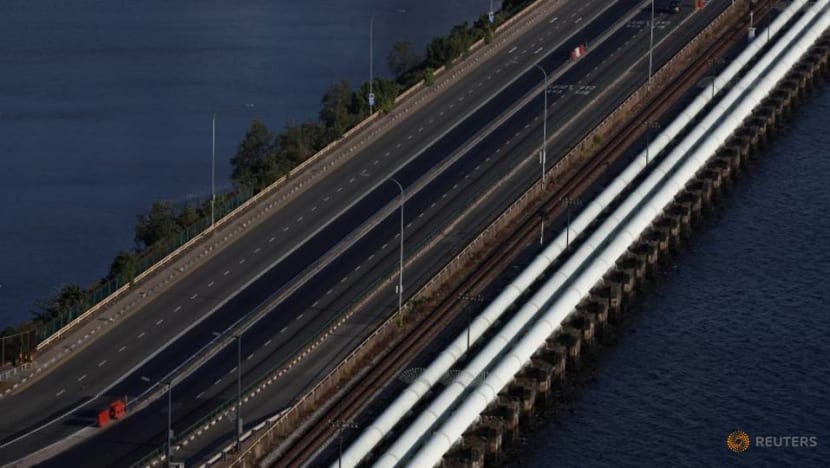Implementing Singapore, Malaysia cross-border travel schemes was ‘right decision’: Johor Chief Minister

Johor chief minister Hasni Mohammad speaking during an exclusive interview with CNA. (Photo: Amir Yusof)
JOHOR BAHRU: The decision by both governments to implement cross-border travel schemes between Singapore and Malaysia – the Reciprocal Green Lane (RGL) and Periodic Commuting Arrangement (PCA) – was the right one, said Johor Chief Minister Hasni Mohammad.
He also stressed that future arrangements that facilitate daily commuting would depend on the rate of compliance to safety protocols.
Speaking to CNA in an exclusive interview on Thursday (Nov 19), Mr Hasni noted that since the PCA and RGL were implemented in August, the number of Malaysians and Singaporeans crossing the land checkpoints at Johor has “increased tremendously”.
“It is a right decision as far as the government is concerned, to allow (resuming) travel in stages. By looking at the numbers under the RGL category, we notice that it helps a lot of businessmen and corporate individuals to carry on with their routine,” he said.
“And for those holding work permits, the standard operating procedures (SOPs) introduced for PCA fit them well. So I suppose we will continue to improve as far as the procedures go,” he added.
The PCA allows Singapore and Malaysia citizens or permanent residents (PRs) who hold long-term immigration passes for business and work purposes in the other country to enter that country for work.
Meanwhile, the RGL is for Malaysia and Singapore residents keen to do shorter-term travel of up to 14 days, for essential business and official purposes.
During the interview, Mr Hasni also expressed hope that the existing schemes would eventually pave the way for the full reopening of the borders once the COVID-19 situation improves.
“I believe the rate of compliance to the SOPs will eventually decide how we move forward,” said Mr Hasni.
He noted that factors like testing procedures and screening processes will have to be ironed out before both Singapore and Malaysia are confident to reopen the border for travellers.

READ: IN FOCUS - How COVID-19 has disrupted the close links between Singapore and Johor
JOHOR'S PROPOSED PROTOCOLS FOR NEW DAILY COMMUTING SCHEME
During the interview, Mr Hasni was also asked to comment on a third scheme that the Johor state government has reportedly proposed – the Daily Commuting Arrangement (DCA).
He explained that the proposed scheme would allow up to 30,000 commuters per day.
In order to facilitate this, he said that the state government would, for instance, issue travel passes every 10 days, and commuters could use the passes to travel across the border for around three times within that period.
Furthermore, he said the state government has suggested the use of nine accredited laboratories capable of carrying out COVID-19 testing for the travellers, and will invite local health professionals to step up testing and screening procedures.
The Benut state assemblyman explained that this scheme will be useful for students as well as Malaysians employed in Singapore who need to commute to and fro every day.
“Now, we have started with RGL and PCA. Perhaps the DCA is something the state will never stop pushing the federal government for, so that they will come up with SOPs to have more categories of travellers moving forward,” said Mr Hasni.
“We have proposed, we have taken the necessary steps to get the federal government, and also Singapore’s Ministry of Health to sit down and evaluate our proposal,” he added.

READ: 'Way beyond my budget' - Malaysians entering Singapore for work under PCA scramble to find rental options
The chief minister said that the scheme will be a boost to Johor’s economy, which has been badly impacted by COVID-19.
Before border restrictions were implemented in March, around 300,000 Malaysians would commute across the border daily for work. The restrictions have left many of them out of work.
Mr Hasni added that he has urged Prime Minister Muhyiddin Yassin, via video conference during a national security council meeting earlier this week, to consider the proposal for DCA put forth by the Johor state government.
“I took the opportunity to highlight to Prime Minister that Johor needs an urgent decision, an early decision, from the federal government. The Prime Minister has given an assurance to Johor state that the special committee will convene on this DCA request and that the Foreign Affairs Ministry will be involved and coordinate to expedite the DCA category for travellers (once approved),” said Mr Hasni.
However, the chief minister acknowledged that possible factors that could influence the committee’s decision would be the recent rise in the number of COVID-19 cases across the country, with new clusters forming each day.
READ: COVID-19: Johor to table plan to Malaysian government on reopening Malaysia-Singapore border, says chief minister
Malaysia is grappling with a third wave of the pandemic. This week, the number of new COVID-19 cases on most days has been above 1,000. There are now more than 53,000 cases nationwide.
On Friday, the Singapore government said it will impose a 14-day stay-home notice period at dedicated facilities for all travellers entering Malaysia, including those on RGL or PCA.
Johor has not been immune to the spread of the coronavirus in recent weeks.
On Thursday and Friday, two new clusters were detected in the southern state - Kiambang and Makmur respectively.
However, Mr Hasni maintained during the interview that positive cases in Johor have been localised to specific areas.
On Friday, the federal government announced that the conditional movement control order (CMCO) will be lifted in four states (Johor, Kedah, Melaka and Terengganu), with the exception of a few districts.
In a statement following the federal announcement, Mr Hasni welcomed the decision, saying the announcement "brought relief" to many Johoreans.
"Even though the CMCO is lifted from tomorrow, I would like to advise all Johoreans to always adhere to SOP in all your daily activities," he said.
"Remember that the pandemic is still ongoing until a vaccine or medicinal cure is found. Hence, together we work to curb the spread of COVID-19," Mr Hasni added.
During the interview with CNA, Mr Hasni maintained that he was confident the recent spike in cases would not impact the potential implementation of the DCA.
He said that although there were certain areas with higher concentration of positive cases, he was optimistic that the areas would be confined and managed effectively, as this has been done for previous clusters in the state.
"Whatever assistance that was required was met, everybody was happy and eventually within a short period of time, we manage to revert to RMCO," said Mr Hasni.
"I suppose when everybody is satisfied with the current SOPs, I don’t see why there's a need to delay the DCA," he added.
Tune in to CNA on Monday morning from 7am to see more of what the Chief Minister has to say about Johor’s economy and cooperation with Singapore.
BOOKMARK THIS: Our comprehensive coverage of the coronavirus outbreak and its developments
Download our app or subscribe to our Telegram channel for the latest updates on the coronavirus outbreak: https://cna.asia/telegram
















